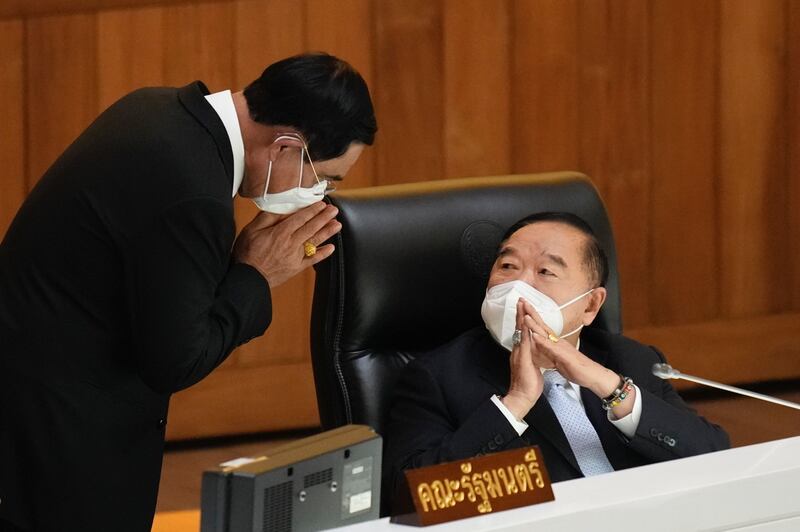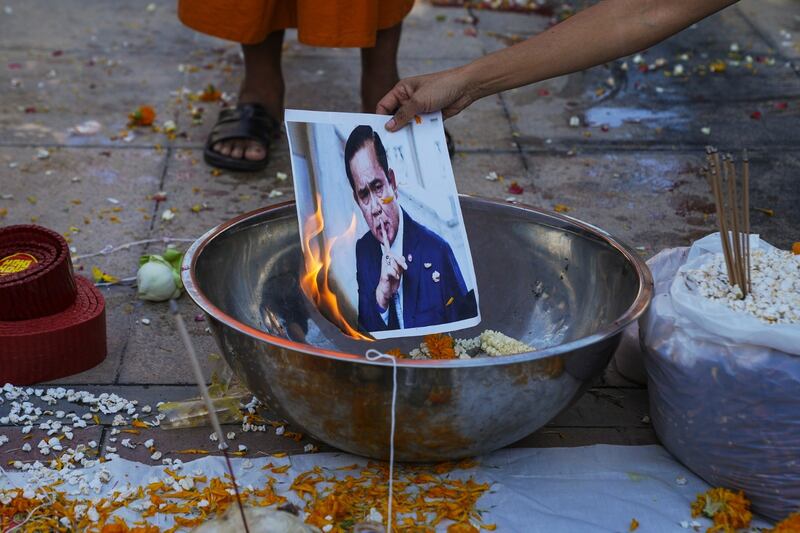Updated at 12:05 p.m. ET on 2022-08-24
Thailand’s Constitutional Court ordered Prayuth Chan-o-cha to halt his duties as prime minister on Wednesday until it rules on a petition arguing that the former junta chief must quit office now because he has used up an eight-year term limit.
More than 170 opposition MPs petitioned the court earlier this week for a ruling on whether Prayuth could stay in power past Aug. 24. They argue that his term ends on the eighth anniversary of that date in 2014 when the former army chief became prime minister after leading a military coup months earlier.
The judges decided unanimously to accept the opposition petition and voted 5 to 4 to order Prayuth “to cease his duty as prime minister until the court delivers a verdict,” according to a written statement by the Constitutional Court.
“The court has considered the petition and accompanying documents. It viewed that facts included in the petition present a reasonable doubt that the petition has grounds,” the statement said.
The court gave Prayuth 15 days after receiving a copy of the order to present his case for remaining in office, but did not say if he had received it.
Deputy Prime Minister Prawit Wongsuwan, the second-highest ranking government official, will be acting in Prayuth’s place, Wissanu Krea-Ngam, another deputy prime minister and the government’s legal expert, told reporters on Monday.
Prawit, 77, the former army chief and a political kingmaker, is the head of the ruling Palang Pracharat Party. He was one of Prayuth’s close political allies and part of the military leaders involved in the 2014 coup.
A government spokeswoman said Prayuth respects the court’s decision.
“Gen. Prayuth respects the decisions by the Constitutional Court and stops performing the duty as prime minister from today until the Constitutional Court has a ruling,” Anucha Burapachaisri told reporters on Wednesday. “This is to entrust the law and the rule of law, which are vital mechanisms for peaceful co-existence in the society and national peace.”
Prayuth, who also serves as defense minister, will continue in that role, Anucha said.

Open to interpretation
It is unclear when the court plans to deliver a final ruling on the petition, which asks the court to decide when exactly Prayuth’s eight-year term in office began and ends, as that question is open to interpretation.
Prayuth took power after overthrowing the elected government of Yingluck Shinawatra in coup in May 2014.
The opposition petition is based on Article 158 of the most recent constitution, drafted by a military-appointed council in 2017, which states the prime minister “shall not hold office for more than eight years in total, whether or not holding consecutive term.”
Prayuth’s critics and opposition parties argue that his term started on Aug. 24, 2014 – about three months after the coup – when the king officially endorsed him as PM following a vote by a legislature dominated by junta-picked lawmakers.
On the other hand, some of Prayuth’s defenders say his tenure started on April 6, 2017, when the current constitution was ratified, saying that it was not retroactive. Others claim his start date should be July 10, 2019, when the parliament elected him prime minister as a civilian leader.
Earlier this month, Khao Sod, an online news website, reported that constitution drafters Michai Ruchuphan and Suphot Khaimuk had said in a 2018 meeting memo that Prayuth would complete his eight-year term on Aug. 24. The opposition MPs reportedly included the memo as evidence in their petition.
The court’s announcement comes as hundreds of anti-government protesters have been demonstrating at Bangkok’s Democracy Monument since Sunday, asking Prayuth to step down voluntarily.
Thai police on Wednesday placed shipping containers and barb wires on some of the streets near the government buildings to stop people’s movement. Dozens of security officials were seen deployed around the area.
Opposition Pheu Thai leader Cholnan Srikaew said the parliament should be the one to choose the new leader of the country instead of appointing Prawit as acting prime minister.
“The opposition has an opinion that Gen. Prayuth Chan-o-cha should resign … to select a new prime minister according to the constitution,” Cholnan said. “I believe the parliament can elect the new premier soon.”
Pita Limjaroenrat, leader of the Move Forward opposition party, said the court should rule on Prayuth’s fate soon.
“The law on this matter is not complicated. ... If the Constitutional Court can decide quickly, the vacuum in the administration we’re concerned about will be short,” he told reporters at parliament.
Thannapat Jarenpanit, a political science lecturer at the Pibulsongkram Rajabhat University, said she expects the court to take about a month to issue its final ruling.
“In fact, we have sensed for a while that the government had tried to help Prayuth step down without causing much damage. I thought he was to dissolve the parliament but surprisingly it did not happen,” she told BenarNews.
“The Constitutional Court in fact, should rule against his premiership because he was the junta leader. He tore up the constitution, clearly against the rule of law and he held on to power that long.”

The Constitutional Court has played an influential role in Thai politics. In 2006 and 2014, it canceled the results of general elections. More recently, it dissolved two parties before and after the 2019 elections, including Future Forward Party, which had become the third largest in the parliament.
Seven of the nine current judges were appointed after the 2014 coup by the junta-dominated national legislative assembly and the senate. Last year, the court ruled that calls for reforms to the monarchy could be considered an attempt to overthrow the royal institution.
The next general election in Thailand is to occur between March and June 2023.
The opposition petition marks the latest attempt by the opposition and Prayuth’s critics to remove the former junta chief from office after he survived a fourth parliamentary no-confidence vote last month.
He has also fended off youth-led pro-democracy street protests since July 2020 which have asked for his resignation and for the constitution and the monarchy to be reformed.
A public opinion poll earlier this week found more than 90 percent of respondents wanted Prayuth to vacate office immediately. More than 370,000 participated in the “People’s Voice” digital poll, launched by a network of eight universities and eight digital media outlets on Aug. 20 and 21.
